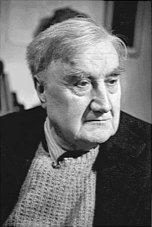 Vaughan
Williams received his training from Hubert Parry and Charles Villiers Stanford,
both composers influenced by Brahms. Early Vaughan
Williams works have their Brahmsian (and Wagnerian)
moments, but in the early music that has survived, we hear something absolutely
original and unique. Vaughan Williams became enthralled
with the English folk song (he was a major collector).
Vaughan
Williams received his training from Hubert Parry and Charles Villiers Stanford,
both composers influenced by Brahms. Early Vaughan
Williams works have their Brahmsian (and Wagnerian)
moments, but in the early music that has survived, we hear something absolutely
original and unique. Vaughan Williams became enthralled
with the English folk song (he was a major collector).
Vaughan Williams fortunately could absorb from diverse sources -- including Stravinsky, Brahms, Parry, Debussy, Ravel, Bach, Byrd, and Hindemith -- and yet remain absolutely and recognizably himself. After a brief flirtation with French Impressionism ("In the Fen Country," String Quartet No. 1) and some study with Ravel (who called him "the only pupil who does not write my music"), he hit the ground running with his incidental music to Aristophanes's "The Wasps," the song cycle "On Wenlock Edge," and the classic "Fantasia on a Theme by Thomas Tallis." These are, to my mind, the first works in which we see the "real" Vaughan Williams. From here on, you can't mistake the voice.
Vaughan Williams composed extensively in almost every genre but chamber music. He is one of the great setters of English poetry, and vocal music comprises a large part of his output. Major works include "Five Mystical Songs," "Merciless Beauty," "Sancta Civitas," "Serenade to Music," "Hodie," "10 Blake Songs," and "Dona nobis pacem." He wrote several operas, not one of which has kept the stage: "Hugh the Drover," "The Poisoned Kiss," "Riders to the Sea," "Sir John in Love," and "Pilgrim's Progress." The last three contain magnificent music. "Sir John" in particular is one great tune after another. There's no accounting for taste.
The symphonies, in particular, contain much of Vaughan Williams's range. Not one is like another. Each represents a unique approach to problems of symphonic form. All, however, have great emotional power. He is a major symphonist.